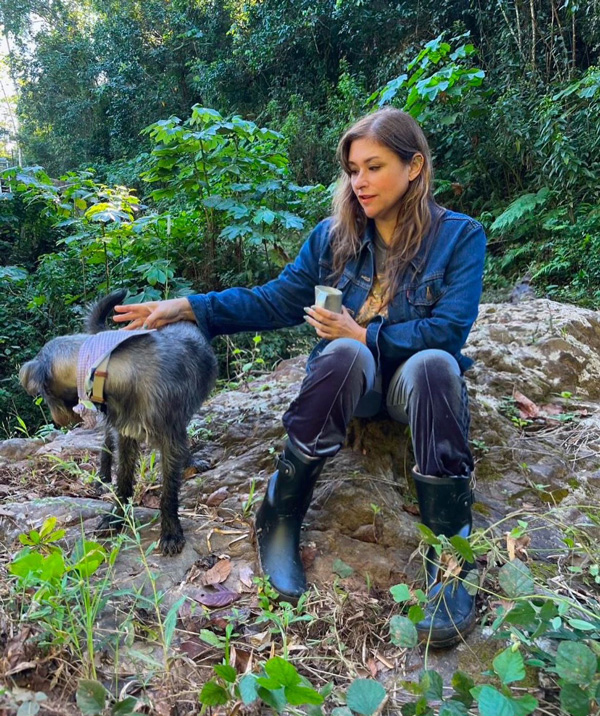She is a woman-tree who knows how to sway her branches in winds of uncertainty and anchor them in possibilities. With Manena, one learns that ‘closing’ one’s eyes to awaken to life is fundamental.
She lives in wonder with life, with her surroundings and with the energies that flow in her sidereal universe. Her name is María Elena González Arsuaga – the name printed on her passport and driver’s license – but for her clan she is Manena.
I press Ma-ne-na on the digital keyboard and dividing its sounds, the quote from my maternal great-grandfather, Doctor Ramón Suárez Calderón, resonates in my eardrum like a present echo: “your name is the sweetest music to your ears.”
Without a doubt, Manena is the archetype of this quote. Her name is melodious music for those who know her. She has a simple and at the same time deep inner world. She has ancestral knowledge. In her gratitude towards life you feel a portrait of a full human being.
Rooted in flying roots, Manena is a woman-tree who knows how to sway her branches in winds of uncertainty and anchor them in possibilities. With her you learn that ‘closing’ your eyes to awaken to life is fundamental.
It shows you the map of how to decipher the code of your name, to know how to listen serenely to the music that we have to dance to on this earthly plane. An earthly plane that transcends the four elements of the planet: earth, air, fire and water. As a Capricorn woman, she accepts the four elements and, planted both on her feet and in platform sandals, she is not afraid to look at the mountain. To climb in order to grow is to be loyal to her Self.
Perhaps that is her greatest certainty, and from her private practice as a family therapist she transmits that truth with a praiseworthy peace and gift for listening. I have seen her in both individual and group sessions, and she has the art of making her audience feel like the protagonist. Her greatest desire is that we can turn on our own camera with compassionate love.
With a multidimensional view: mind, body and spirit, Manena teaches us to portray our inner photography. Sometimes, she warns that the tones of the photos are white, black, grey, sepia, camouflaged or multicoloured. But she assures that all the photos are editable, and make up the great album of who we are.
In her case, she had to learn from a very early age to love life from any lens. To feel love in living memory. She was about 10 years old when her mother’s partner asked her to go for a walk to the pharmacy to buy some film for the camera.
She bought them enthusiastically, and when she arrived at the apartment she witnessed a femicide. Her mother, a woman of the vanguard, defender of the just (who, without knowing, I feel I know) was the victim. She then had to live with her grandparents and her older sister. They felt the pain of love together, and continue to heal.
Manena has been transforming her scar into an evolutionary healing. Healing herself from within with immeasurable acceptance. That same love for herself is the antidote in her profession.
“Listening to our body and paying attention to it with tenderness is fundamental. It doesn’t matter what you have been through, what you have or are carrying. That burden may have been or exists to protect you, but it can be transformed. Historical, family, individual or intangible traumas are real. We have to process those emotions carefully. There is no other way,” she asserts from her stool.
Meanwhile, Olivia, her Puerto Rican dog, raises her snout to say hello. She knows her. They know each other well. She caresses her. She smiles and adds: “Bibiana, it is up to all of us to feel and accept things as they are, and what was as they were. I would love to have my mother alive, and give her a hug, but I can’t. The next day we were going on a trip and it never happened.”
At her young age, understanding that “things are as they are” is a challenge for the big leagues, for a mountaineer, but she made her way through setbacks. She is infinitely grateful for the overflowing love of her grandparents. She looks at me and, with the simplicity of someone pouring water into a glass, reiterates: “We are all learning in this life. No one is an expert. To evolve, we have to want to. We have to adapt, be brave and visit our fields of gratitude.”
Manena put into practice what she discovered in her pre-adolescence. In fact, today she sees many young people as a family therapist, and she is passionate about it. She then goes back to her rebellious times, when Manena was almost replaced by another nickname.
Her friends called her “Fosforito” because she lit the fuse with Olympic speed. That fire, that passion for life has not diminished, but she has regulated it. Today she lives with grace.
Thanks to tireless work with herself. She always has a “backpack” of well-being within reach. In it there is everything from yoga expertise, meditations, breathing exercises to the shortest shortcut to walk or drive to the beach and float in the salty sea.
In all these life skills, Manena has been formally educated to also authentically empower her clients. Her best pedagogy is to be an example. To live her own therapy.
She says that, at the Dharma House, located in Santurce, and where they offer a range of workshops that seek integral development, she had an extraordinary epiphany. Then she learned that this house belonged to her family. She says that, in one of the workshops, while she closed her eyelids to calm her nervous system, she heard children playing inside her. That laughter caressed her insides like a maternal embrace. These are sounds that today drive her in her life, in her work, in her entire being.
I think that Manena revived that ancestral memory because she has forged her growth with tenacity. She is an admirable woman. Today she breathes freely – without any fear of digging, and marveling at her own vulnerabilities – even when they may mean staggering between deposits.
Deep down, I think that Manena’s inner strength lies in an overcome loss. In a truth necessary for humanity: love never dies, it transcends.
A feeling that she rectified when she studied at Boston College and went to visit the Early Childhood Programming Center where she reconnected with the cook she had as a child because she attended this center when they lived for a while in that state. Her mother was a social worker.
I also ponder how the small journeys in life lead us to long walks. Or how the tributaries of a river flow into estuaries and embrace the open sea.
I answer myself when writing the profile of a Puerto Rican woman with a little more than half a century – that time is not linear, that wisdom has no age. That the “camera rolls” that Manena was sent to buy that fateful afternoon, she unrolled them in fullness.
They unrolled in a game of looking for and losing each other: thanks to a loving upbringing with her grandparents; thanks to her sister friends from high school; thanks to her studies in Boston, and in San Diego as a family therapist; Thanks to her work season in New York until she said “I don’t want to speak English anymore, I want to go back to Puerto Rico.”
Thanks also to the tribes of her heterogeneous world; thanks to her work with non-profit entities; thanks to her extensive experience as an evaluator in Early Education Programs; thanks to her plethora of certifications in various disciplines that promote social well-being; thanks to her love for Mexico, and above all thanks to herself.
In short, opening the doors of her truth so that others can heal symbolizes fidelity to her musical name – Manena – a name that always dances in solidarity.



